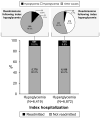Recurrent hospitalizations for severe hypoglycemia and hyperglycemia among U.S. adults with diabetes
- PMID: 29751961
- PMCID: PMC6015781
- DOI: 10.1016/j.jdiacomp.2018.04.007
Recurrent hospitalizations for severe hypoglycemia and hyperglycemia among U.S. adults with diabetes
Abstract
Aims: Examine 30-day readmissions for recurrent hypoglycemia and hyperglycemia in a national cohort of adults with diabetes.
Methods: Retrospective analysis of data from OptumLabs Data Warehouse for all adults with diabetes hospitalized January 1, 2009 to December 31, 2014 with a principal diagnosis of hypoglycemia or hyperglycemia. We examined the rates and risk factors of 30-day readmissions for hypoglycemia and hyperglycemia.
Results: After 6419 index hypoglycemia hospitalizations, 1.2% were readmitted for recurrent hypoglycemia, 0.2% for hyperglycemia, and 8.6% for other causes. Multimorbidity was the strongest predictor of recurrent hypoglycemia. After 6872 index hyperglycemia hospitalizations, 4.0% were readmitted for recurrent hyperglycemia, 0.4% for hypoglycemia, and 5.4% for other causes. Recurrent hyperglycemia was less likely in older patients (OR 0.6, 95% CI 0.5-0.9 for 45-64 vs. <45 years) and with the addition of a new glucose-lowering medication at index discharge (OR 0.40; 95% CI 0.2-0.7). New hypoglycemia readmissions were most likely among patients ≥75 years (OR 13.3, 95% CI 2.4-73.4, vs. <45 years).
Conclusions: Patients hospitalized for hyperglycemia are often readmitted for recurrent hyperglycemia, while patients hospitalized for hypoglycemia are generally readmitted for unrelated causes. Early recognition of high risk patients may identify opportunities to improve post-discharge management and reduce these events.
Keywords: Diabetes; Hospitalization; Hyperglycemic hyperosmolar state (HHS); Hypoglycemia; Ketoacidosis (DKA); Readmission.
Copyright © 2018 Elsevier Inc. All rights reserved.
Figures
Similar articles
-
Hospital Readmissions among Commercially Insured and Medicare Advantage Beneficiaries with Diabetes and the Impact of Severe Hypoglycemic and Hyperglycemic Events.J Gen Intern Med. 2017 Oct;32(10):1097-1105. doi: 10.1007/s11606-017-4095-x. Epub 2017 Jul 6. J Gen Intern Med. 2017. PMID: 28685482 Free PMC article.
-
Effectiveness of a multidisciplinary team approach to the prevention of readmission for acute glycaemic events.Diabet Med. 2015 Oct;32(10):1361-7. doi: 10.1111/dme.12779. Epub 2015 Apr 27. Diabet Med. 2015. PMID: 25865087 Clinical Trial.
-
Association of Area-Level Socioeconomic Deprivation With Hypoglycemic and Hyperglycemic Crises in US Adults With Diabetes.JAMA Netw Open. 2022 Jan 4;5(1):e2143597. doi: 10.1001/jamanetworkopen.2021.43597. JAMA Netw Open. 2022. PMID: 35040969 Free PMC article.
-
Diabetic ketoacidosis and hyperglycemic hyperosmolar state.Endocrinol Metab Clin North Am. 2013 Dec;42(4):677-95. doi: 10.1016/j.ecl.2013.07.001. Endocrinol Metab Clin North Am. 2013. PMID: 24286946 Review.
-
[Diabetic emergencies : Hypoglycemia, ketoacidotic and hyperglycemic hyperosmolar nonketotic coma].Internist (Berl). 2017 Oct;58(10):1020-1028. doi: 10.1007/s00108-017-0317-x. Internist (Berl). 2017. PMID: 28849301 Review. German.
Cited by
-
Hyperglycaemic crises in adults with diabetes: a consensus report.Diabetologia. 2024 Aug;67(8):1455-1479. doi: 10.1007/s00125-024-06183-8. Epub 2024 Jun 22. Diabetologia. 2024. PMID: 38907161 Free PMC article.
-
Predictors of 30-day unplanned hospital readmission among adult patients with diabetes mellitus: a systematic review with meta-analysis.BMJ Open Diabetes Res Care. 2020 Aug;8(1):e001227. doi: 10.1136/bmjdrc-2020-001227. BMJ Open Diabetes Res Care. 2020. PMID: 32784248 Free PMC article. Review.
-
Follow up care for adults with diabetes treated for severe hypoglycemia by emergency medical Services, 2013-2019.Diabetes Res Clin Pract. 2024 Jul;213:111741. doi: 10.1016/j.diabres.2024.111741. Epub 2024 Jun 10. Diabetes Res Clin Pract. 2024. PMID: 38866184
-
Barriers to USMLE Step-1 accommodations: Students with Type 1 Diabetes.PLoS One. 2024 Jun 18;19(6):e0304784. doi: 10.1371/journal.pone.0304784. eCollection 2024. PLoS One. 2024. PMID: 38889174 Free PMC article.
-
Paradox of glycemic management: multimorbidity, glycemic control, and high-risk medication use among adults with diabetes.BMJ Open Diabetes Res Care. 2020 Feb;8(1):e001007. doi: 10.1136/bmjdrc-2019-001007. BMJ Open Diabetes Res Care. 2020. PMID: 32075810 Free PMC article.
References
-
- Khunti K, Davies M, Majeed A, Thorsted BL, Wolden ML, Paul SK. Hypoglycemia and risk of cardiovascular disease and all-cause mortality in insulin-treated people with type 1 and type 2 diabetes: a cohort study. Diabetes Care. 2015;38(2):316–322. - PubMed
-
- Goto A, Arah OA, Goto M, Terauchi Y, Noda M. Severe hypoglycaemia and cardiovascular disease: systematic review and meta-analysis with bias analysis. BMJ. 2013;347:f4533. - PubMed
-
- Williams SA, Shi L, Brenneman SK, Johnson JC, Wegner JC, Fonseca V. The burden of hypoglycemia on healthcare utilization, costs, and quality of life among type 2 diabetes mellitus patients. J Diabetes Complications. 2012;26(5):399–406. - PubMed
-
- Veronese G, Marchesini G, Forlani G, et al. Costs associated with emergency care and hospitalization for severe hypoglycemia. Nutr Metab Cardiovasc Dis. 2016;26(4):345–351. - PubMed
MeSH terms
Grants and funding
LinkOut - more resources
Full Text Sources
Other Literature Sources
Medical


